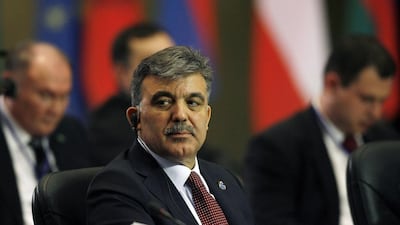Foreign Correspondent
ISTANBUL // The decision by Turkey’s prime minister, Recep Tayyip Erdogan, to block access to Twitter, triggered a rare public condemnation yesterday by the nation’s president, Abdullah Gul.
Mr Gul defiantly used the social-media site to criticise the restriction as unacceptable, in a development that highlighted a growing rift between two men who have shaped Turkish politics for more than a decade.
“If there have been crimes like the violation of people’s rights, only individual pages can be banned by court order,” Mr Gul said on Twitter. “I hope that this practice does not last long.”
The ban was ordered by the government’s internet agency on Thursday after what it said was a refusal by Twitter to block several tweets whose deletion had been ordered by Turkish courts. It came after Mr Erdogan said he would “rip out the roots” of the website at a campaign rally on Thursday for the March 30 municipal elections. Twitter is where leaks to recordings appeared that seemed to implicate him and other top officials in a corruption scandal, which has posed the most serious test to his 11 years in power.
The content of Mr Gul’s message – and the way it was delivered – was a message to Mr Erdogan’s religiously conservative government, observers said.
“This would certainly upset the prime minister,” said Mustafa Akyol, an author and newspaper columnist. “Disagreements are becoming harder to reconcile.”
Earlier this week, Mr Gul made the headlines by distancing himself from Mr Erdogan’s handling of a corruption scandal that has engulfed the government since last December.
Mr Erdogan has called the corruption allegations parts of a foreign plot against Turkey, but Mr Gul dismissed the prime minister’s statement as “worthy of a third world country”.
Mr Gul, 63, and Mr Erdogan, 60, both started their careers in an Islamist party later banned by the courts and are co-founders of the ruling Justice and Development Party (AKP) as well as long-time political allies.
Mr Gul served as the first AKP prime minister from late 2002 until March 2003, when he made room for Mr Erdogan and became foreign minister.
Mr Gul, who is seen as a more liberal politician than Mr Erdogan and a strong supporter of Turkey’s bid to join the European Union, was elected president in 2007 and remains highly respected within the AKP.
Analysts said Mr Gul wanted to make clear that he did not like the direction that the country was taking under Mr Erdogan.
“This is an effort to counterbalance the harm” done by the Twitter ban, Ilter Turan, a political scientist at Istanbul’s Bilgi University said. The political relationship between Mr Gul and Mr Erdogan was “slowly developing into a more open difference of opinions”.
Mr Turan said Mr Erdogan was running the risk of ruining his chances to become president in elections scheduled for August. “By his own actions, he may be disqualifying himself as a candidate”.
Some AKP ministers and members of parliament had displayed a marked “lack of spirit” in executing Mr Erdogan’s orders lately, Mr Turan said.
If the AKP was to do worse than expected in the March 30 elections, Mr Erdogan’s role as party leader could come into question, he said.
Most polls indicate the AKP, which has led the country through a massive economic boom and has pleased religiously conservative voters by ending a ban of the Islamic headscarf in state institutions, is likely to keep its position as Turkey’s strongest party with around 40 per cent of the vote in the upcoming elections.
But some polls suggest Mr Erdogan’s party could do badly in some big cities like Istanbul, Ankara and Izmir.
Mr Akyol, the author, said Mr Erdogan remained popular with many conservative Turks despite the wave of protests after the Twitter ban.
“For the average Erdogan voter, the Twitter ban is not a problem,” he said.
The attempt to block to Twitter appeared to backfire with many tech-savvy users – besides Mr Gul – circumventing the ban.
By midday Friday, tweets were continuing unabated as users swapped instructions online on how to change settings. One enterprising user spread the word by defacing Turkish election posters with instructions on beating censors, the Associated Press reported.
The European Commission Vice President Neelie Kroes criticised the ban – in a country that is seeking to join the European Union – as “groundless, pointless, cowardly.”
Stefan Fule, the EU commissioner in charge of enlargement, said he was concerned.
foreign.desk@thenational.ae

